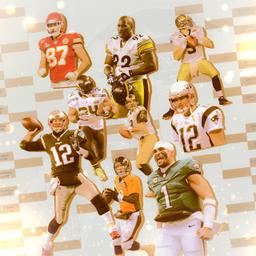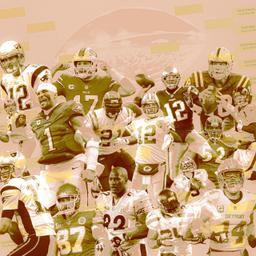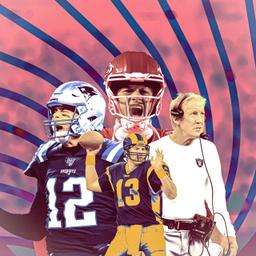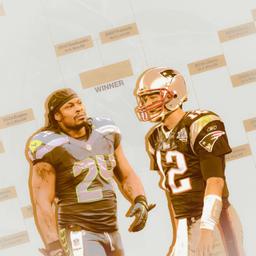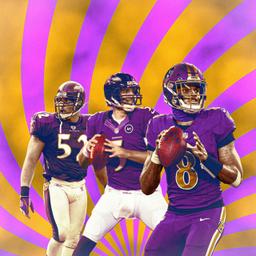Editor’s note: The second-round polls have closed. Vote in the championship here! You can also check out every team we considered for the bracket and how the NFL has evolved over the past 25 years.
Round 1 of our bracket to determine the best NFL team of the quarter century is in the books, and it was mostly chalk. All the 1- and 2-seeds advanced handily, and there were only two upsets: The 2006 Colts toppled the 2020 Buccaneers (another postseason win for Peyton Manning over Tom Brady!), and the 2014 Patriots just eked out a victory over the 2008 Steelers. That means a few things:
First, so long to Pittsburgh. The franchise with the second-most wins since 2000 is now kaput in this bracket since the 2005 Steelers also lost to the 2002 Buccaneers.
Second, the Patriots’ dominance extends into this bracket. The only Pats team not to make it out of the first round was the 2001 squad, which lost to … the 2007 New England Patriots. Now, fully half of the matchups today feature Patriots squads.
Finally, the first round demonstrated the importance of postseason success. That 2007 vs. 2001 Patriots matchup was the only instance in which a Super Bowl loser beat a Super Bowl winner. The only other Lombardi-winning teams to go home yesterday lost to other Lombardi winners.
Today, things heat up. We have an incredible offense vs. defense showdown with the 2000 Ravens vs. the 2001 Rams. For what it’s worth, the 1999 versions of these teams faced each other, with St. Louis winning 27-10, but while the Rams were squarely in their Greatest Show on Turf era, the Ravens defense had not yet hit its peak.
We also have a classic Patriots-Eagles face-off, with 2004 New England taking on 2017 Philadelphia. That Eagles team famously beat one Patriots squad; can it take another?
Elsewhere, the Chiefs get a couple of dream matchups. The 2022 team takes on the 2007 Patriots, while the 2019 team will challenge the 2006 Colts. Patrick Mahomes vs. Brady and Mahomes vs. Manning in one day—these are the matchups we hoped for when making this bracket.
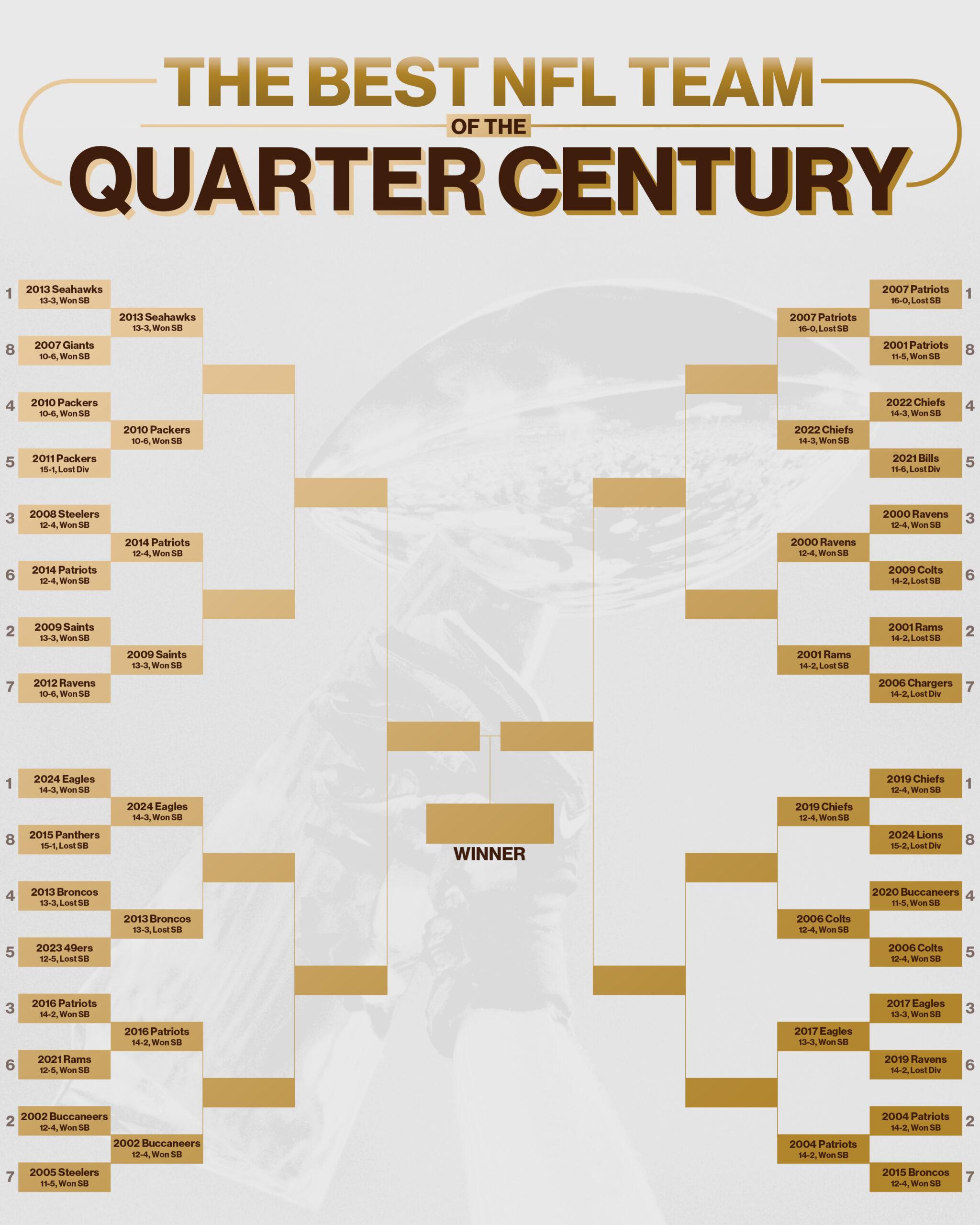
Once again, voting will close at 6 p.m. ET. Come back tomorrow for more matchups. —Riley McAtee
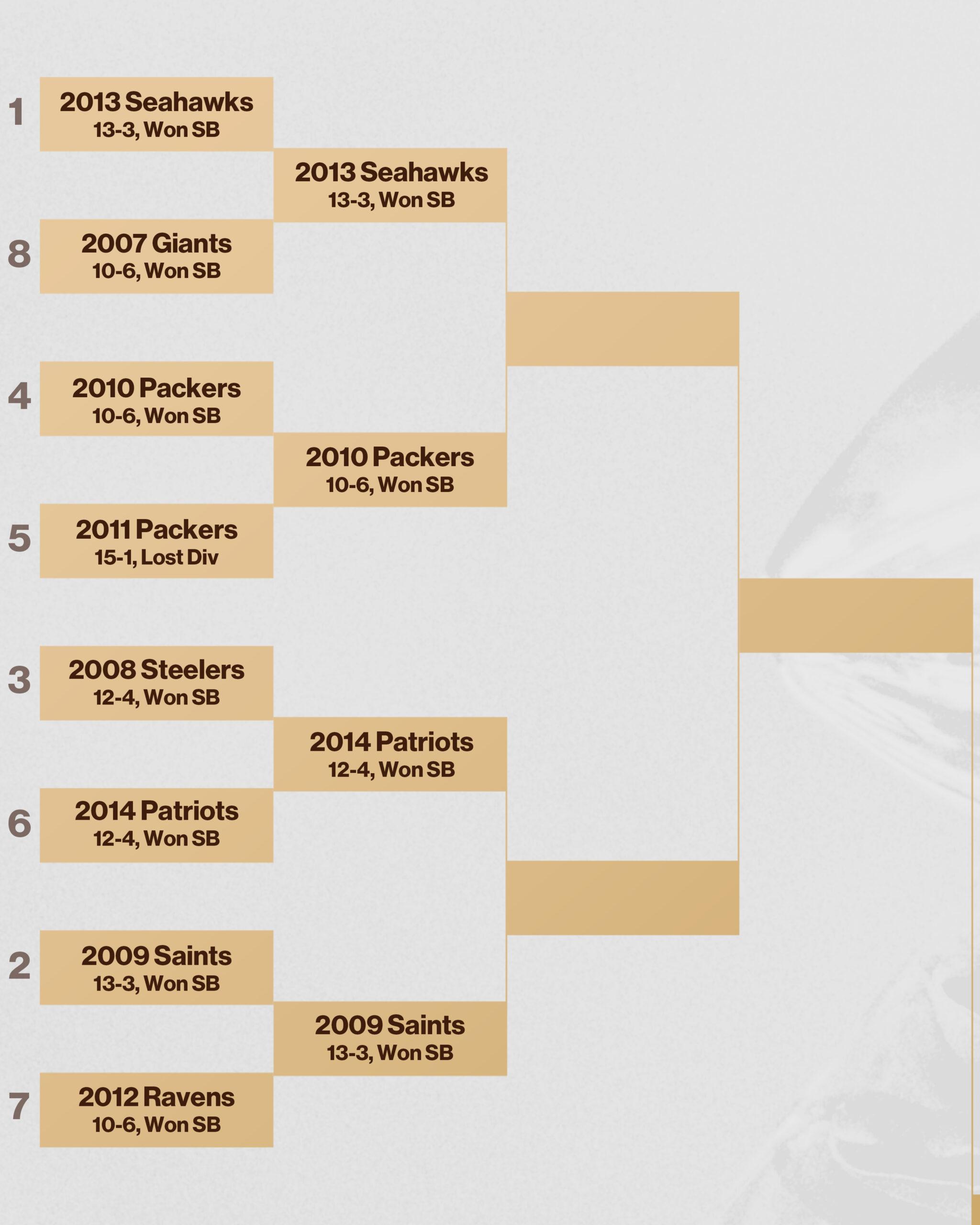
(1) 2013 Seattle Seahawks vs. (4) 2010 Green Bay Packers
2013 Seahawks
Record: 13-3
Result: Won Super Bowl XLVIII (43-8 vs. Broncos)
There are a million things I could write about the peak era of the Seahawks Legion of Boom defense, but perhaps the easiest explanation for just how ludicrously good that unit really was is this: On the biggest stage, in Seattle’s 43-8 blowout victory over the Broncos in Super Bowl XLVIII, the Seahawks made league-MVP Peyton Manning and the NFL’s all-time highest-scoring offense look like a bumbling JV squad.
The much-anticipated heavyweight bout quickly turned into a lopsided rout. The Broncos, who had racked up an NFL-record 606 points (37.9 points per game) on the back of Manning’s league-record 55 touchdown throws, were left completely disoriented by the LOB's extraordinarily disciplined, hard-hitting style. The Seahawks forced a failed-snap safety on the Broncos’ first play from scrimmage before picking Manning off on his team’s next two possessions—the second, a 69-yard pick-six, made it 22-0 and more or less put the game away before the first half even ended. The trio of Richard Sherman, Earl Thomas, and Kam Chancellor held things down in the back end, bolstered up front by the likes of Bobby Wagner, K.J. Wright, Michael Bennett, Cliff Avril, and a host of others.
That outcome came as no surprise to the uniquely brash, trash-talking Seahawks defense, which had allowed the fewest points (14.4 per game) and fewest yards (273.6 per game) of any team in the NFL that season while generating a league-best 39 takeaways. That unit ranked first in defensive DVOA that year, obviously, and ranks eighth best on the all-time DVOA list. The team’s offense, led by plucky then-second-year quarterback Russell Wilson, carried its own weight, of course, finishing the year tied for eighth in points per game and seventh in DVOA. Wilson paired up with Marshawn Lynch to help reanimate the read option in pro football, and Lynch gave the offense an identity of toughness that rivaled that of their defensive counterparts. Add in the team’s highly efficient special teams group (which ranked fifth in DVOA that year), and it’s clear that the team general manager John Schneider and head coach Pete Carroll built that year will go down as one of the most complete, most fun, and most dominant we’ll ever see. —Danny Kelly
2010 Packers
Record: 10-6
Result: Won Super Bowl XLV (31-25 vs. Steelers)
The 2010 Packers are tied with the 2012 Ravens and the 2007 Giants for the worst record in this bracket, at 10-6. They were a 6-seed (which was the lowest seed at the time, back before the dreaded 7-seed entered our national consciousness) heading into that year’s playoffs, and they had little in the way of national belief. So why are they ranked as high as a 4-seed here when there are plenty of worthy teams behind them?
First: The record is deceptive. That year’s Packers team never lost a game by more than four points. They also never trailed in a game by more than seven, the first team to do that since the 1962 Lions. They weren’t just a group that managed to sneak into the postseason by the skin of their teeth and then got hot: They were always better than their record indicated. Second: This team absolutely ripped. Aaron Rodgers was tops in the NFL in QBR across the back half of the season, Clay Matthews was on a career-level tear, and he and Charles Woodson led one of the few legitimately good defenses the Packers have had this century. And last: They won a championship, the first and—likely—only of Rodgers’s career, beating out the Ben Roethlisberger–led Steelers in Super Bowl XLV. The 2011 Packers may have reached higher regular-season heights, but everything started with this season—and a ring is the ultimate trump card. —Megan Schuster
(2) 2009 New Orleans Saints vs. (6) 2014 New England Patriots
2009 Saints
Record: 13-3
Result: Won Super Bowl XLIV (31-17 vs. Colts)
If you weren’t rooting for the Saints to win the Super Bowl in 2009, you were a Colts fan, a Vikings fan, or morally bankrupt. Five years after Hurricane Katrina had led residents to seek refuge in the Superdome, and three years after Steve Gleason’s blocked punt in the Superdome on Monday Night Football, the New Orleans Saints were the most incredible story in sports.
The Saints were the first NFC team to start 12-0 or better since the ’85 Bears. They clinched the no. 1 seed in the conference for the first time in team history. Drew Brees completed 70 percent of his passes (which is now quaint but at the time had never been done before). The Saints bested Brett Favre in the NFC championship and then faced what was, to that point, potentially the best Peyton Manning Colts team we’d ever seen in the Super Bowl. Sean Payton made perhaps the ballsiest decision in football history, trying a surprise onside kick out of halftime—and it worked. Tracy Porter pick-sixed Manning—possibly because Indy’s Reggie Wayne slowed down on a route that he didn’t think he was getting the ball on—and the play led to so much traffic on Twitter that the site crashed (which is now a pretty routine occurrence).
Brees, a guy who'd left the Chargers with a crooked elbow and then failed his physical in Miami, was captured in an iconic pose holding the Lombardi Trophy with his son in hand and confetti raining down. He was an underdog story for an underdog city. It’s still the only pro sports championship New Orleans has ever won. Frankly, the 2009 Saints probably meant more to their city than any other team on this list. —Danny Heifetz
2014 Patriots
Record: 12-4
Result: Won Super Bowl XLIX (28-24 vs. Seahawks)
The 2014 Patriots were the team that extended the dynasty. Tom Brady and Bill Belichick had won three championships together in quick succession in the early 2000s. But it had been a decade since their last Super Bowl win, against the Eagles at the end of the 2004 season, and the wear and tear of long playoff runs, roster attrition, and that pesky Eli Manning had kept the Lombardi out of Patriot hands. It was the rather unlikely 2014 team that changed all that and kick-started the next run of dominance in New England over the following half decade.
Not that any team with Brady can be considered plucky underdogs. Brady had a stellar season in 2014, with 33 touchdowns and more than 4,000 passing yards. It was his skill that kept the offense on track through the first half of the season, when the run game and pass protection were relatively inconsistent and the defense struggled to defend against big plays.
But over time, 2014 revealed itself as a quintessential Patriots season. Cornerbacks Brandon Browner and especially Darrelle Revis, who’d signed to New England that offseason, hit their stride in Belichick’s defense. Homegrown players like Rob Gronkowski and Chandler Jones blossomed into stars. No-name running back Jonas Gray steadied the ground game later in the year.
Everyone remembers how this season ended, with undrafted rookie cornerback Malcolm Butler’s interception in the Super Bowl against Russell Wilson and the Seahawks, set up by Belichick’s apparent mind reading of Pete Carroll on the opposite sideline. That play symbolized an entire season in which New England had won with strategy and preparation and found value in unexpected places. —Nora Princiotti
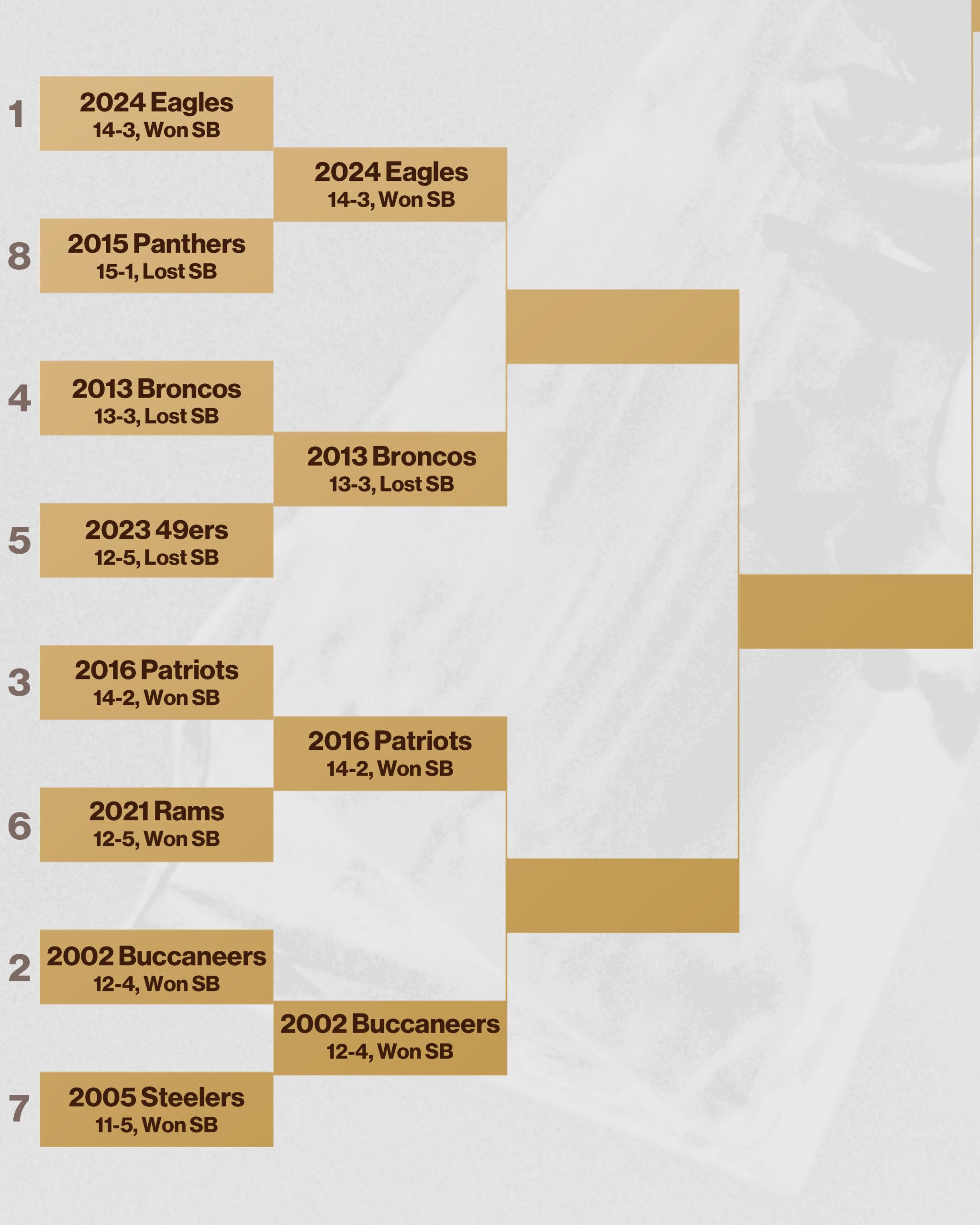
(1) 2024 Philadelphia Eagles vs. (4) 2013 Denver Broncos
2024 Eagles
Record: 14-3
Result: Won Super Bowl LIX (40-22 vs. Chiefs)
It took a little while, but by the time the 2024 Eagles got to New Orleans to take on the Chiefs in the Super Bowl, it was clear that they were one of the best teams of this century. The Eagles had gotten off to a 2-2 start but then won 16 of their next 17 games, en route to a convincing championship. Vic Fangio’s defense was built from back to front, with suffocating coverage that allowed the pass rush time to get home. And the Eagles held up against top-tier quarterbacks like Patrick Mahomes, Lamar Jackson, Joe Burrow, Matthew Stafford, and Jayden Daniels. This defense was tested often, and it came out on top over and over and over again.
Offensively, the goal was to be a pick-your-poison unit. Pound the ball with Saquon Barkley and a dominant offensive line until defenses prove that they can stop you. If that happened, Philly could lean on Jalen Hurts, A.J. Brown, DeVonta Smith, and the passing game. In the Super Bowl, Chiefs defensive coordinator Steve Spagnuolo effectively loaded the box to limit Barkley’s production. But it didn’t matter because Hurts lit Kansas City up through the air as the Eagles rolled to a dominant 40-22 victory. (Reminder: It was 40-6 before two Chiefs garbage-time touchdowns.)
Overall, the Eagles outscored their opponents by 68 points in the playoffs—the third-best differential of any Super Bowl team this century. From a roster talent standpoint, there aren’t too many teams on this list that stack up to the 2024 Eagles. Howie Roseman built a juggernaut, and when things clicked, it seemed like this team was unbeatable. —Sheil Kapadia
2013 Broncos
Record: 13-3
Result: Lost Super Bowl XLVIII (43-8 vs. Seahawks)
We don’t need to talk about how it all ended, OK? The snap that whizzed past Peyton Manning’s head on the first play of the Super Bowl or how Seattle’s Legion of Boom throttled Denver’s offense? Nope, nope, nope. Until that day in February, Manning’s 2013 Broncos were unstoppable, and the quarterback was at the peak of his powers in his second year in Denver. The Broncos scored 49 points in a Week 1 win over the Ravens, the defending Super Bowl champs who had upset Denver in the playoffs at the end of the 2012 season; 52 against Chip Kelly’s Eagles in Week 3; and 51 a week later in an epic shoot-out with Tony Romo’s Cowboys (I will never tire of watching Manning fool the entire Dallas defense on the slowest rushing touchdown you’ve ever seen.) By the time the regular season was over, Manning was the MVP after throwing for 5,477 yards and 55 touchdowns, and the Broncos offense owned new single-season records for points and passing yards.
They did all this amid a very weird season. Head coach John Fox had to take medical leave in the middle of the season after undergoing surgery to replace a heart valve. Star pass rusher Von Miller was suspended six games for a violation of the substance abuse policy. They lost star left tackle Ryan Clady to a season-ending foot injury in Week 2, big free agent addition Wes Welker dealt with concussions late in the year, and the defense lost starters Chris Harris Jr., Derek Wolfe, Rahim Moore, Kevin Vickerson, and Miller to season-ending injuries by the playoffs. The team that showed up to play the Seahawks in the Meadowlands was far from complete. But holy hell, was that regular-season offense unlike anything we had ever seen or may see again. —Lindsay Jones
(2) 2002 Tampa Bay Buccaneers vs. (3) 2016 New England Patriots
2002 Buccaneers
Record: 12-4
Result: Won Super Bowl XXXVII (48-21 vs. Raiders)
The 2002 Buccaneers aren’t just one of the best teams of the last 25 years, and they didn’t just have one of the best defenses we’ve ever seen. They were the apex (in my opinion) for the most transformative and influential defense of the century, they planted the early seeds of offensive construction that ultimately became the Sean McVay–Kyle Shanahan renaissance we’ve seen over the past decade, and they delivered arguably the most dominant string of playoff wins we may ever see in pro football.
The move that made the Buccaneers’ championship run possible was a huge trade in February 2002 for now disgraced head coach Jon Gruden—sending a haul of two first-rounders and two second-rounders to the Raiders in exchange for the young offensive guru. Gruden remade the offense to feature a more north-south rushing attack, added receiver Keenan McCardell to play opposite Keyshawn Johnson, and implemented the kinds of condensed formations and comprehensive dropback passing concepts that typify today’s approach to offense. Quarterback Brad Johnson put up the most efficient season of his career and made the Pro Bowl as a result.
Gruden also kept former head coach Tony Dungy’s defensive staff on board, and that unit dominated the league, allowing more than 14 points in just eight games all year (including the playoffs). En route to winning Super Bowl XXXVII, the Bucs forced 12 turnovers and allowed an opponent passer rating of just 45.9 in their three playoff games, capping the season off with three pick-sixes against the Raiders. Their foundational players (Warren Sapp, Simeon Rice, Derrick Brooks, and Ronde Barber) each came to represent the platonic ideals of their respective positions, and you could drop that unit into today’s NFL and watch them brilliantly execute the “Tampa 2” against any offense you lined them up against.
We’ve been fortunate to witness several teams that have totally changed how we see the sport over the past few decades, but not one of them would want to match up against the ’02 Bucs. —Diante Lee
2016 Patriots
Record: 14-2
Result: Won Super Bowl LI (34-28 OT vs. Falcons)
A season that ended with Tom Brady’s crowning achievement began with one of his lowest moments: serving a four-game suspension for his role in the Deflategate scandal. But his absence almost didn’t matter to this team. The Pats went 3-1 to start the season, losing only the Week 4 matchup because third-string rookie Jacoby Brissett was forced to play with a torn thumb ligament. Such is the case when you have a stacked roster and a coaching staff operating at the peak of its powers.
The Patriots would lose just one more game that season, with Brady posting an absurd 28-2 touchdown-to-interception ratio (still the best ever) following his return. This team had seven All-Pros—just two shy of the 2007 Pats’ tally—and boasted so much talent that it was able to survive a season-ending injury to Rob Gronkowski (a luxury of having Martellus Bennett as your no. 2 tight end) and the continued employment of Matt Patricia. (We joke, but his unit did take “bend don’t break” to its extreme that year—the Pats defense finished 16th in DVOA but first in points allowed.)
The regular season was just prologue to a masterpiece, however: the 28-3 Super Bowl comeback versus the Falcons. It was Brady’s fifth Super Bowl and his finest moment—the one that put to rest any other GOAT arguments. And it was made all the sweeter by him standing on the podium, celebrating another Lombardi Trophy within earshot of the man who had suspended him just months earlier. Football immortality and the ultimate vindication. —Justin Sayles
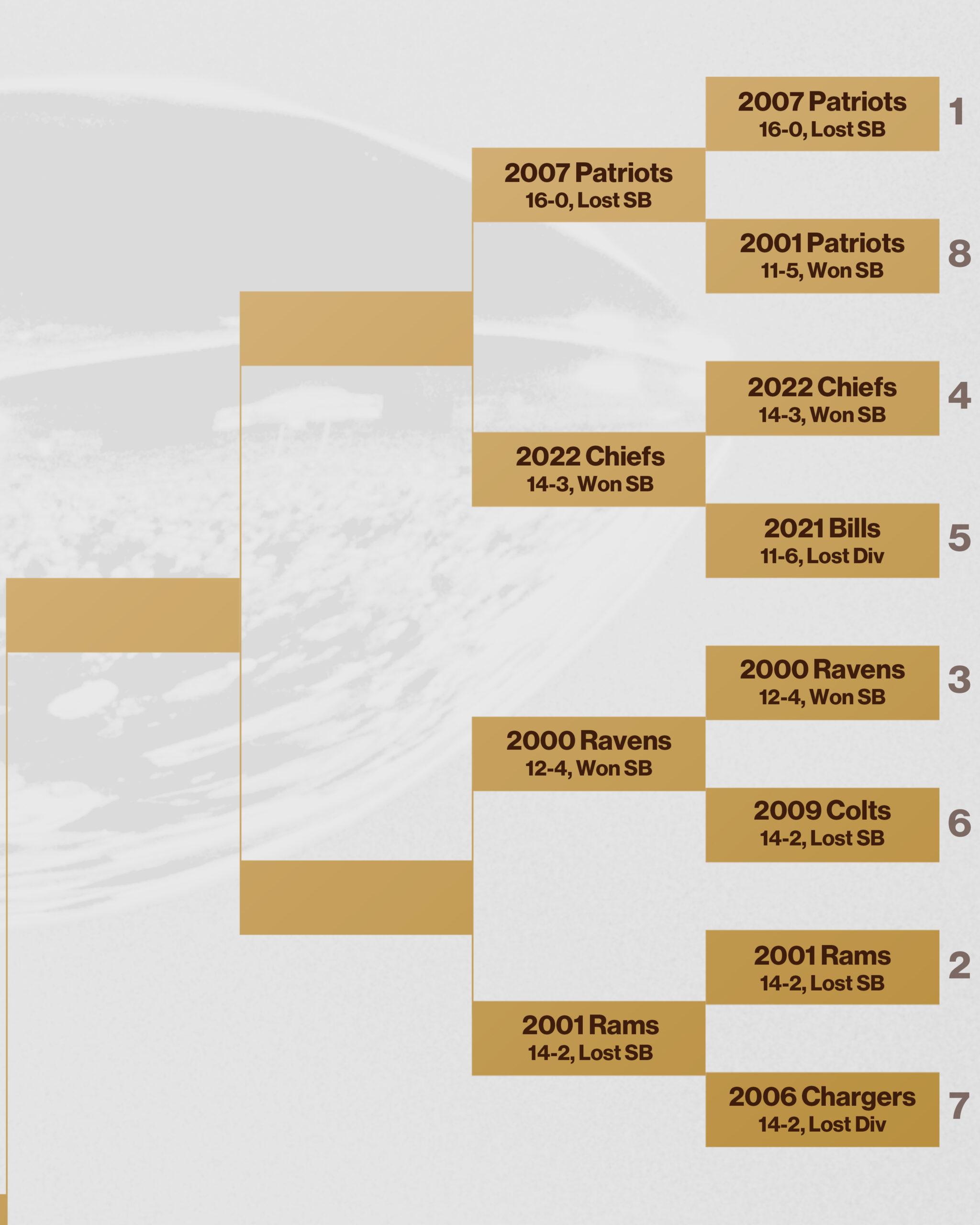
(1) 2007 New England Patriots vs. (4) 2022 Kansas City Chiefs
2007 Patriots
Record: 16-0
Result: Lost Super Bowl XLII (17-14 vs. Giants)
The New York Giants beating the undefeated 2007 Patriots was perhaps the single greatest moment of my life. So as a Giants fan, I feel uniquely qualified to say that the 2007 New England Patriots are unequivocally the best football team of the 21st century, even though they did not win the Super Bowl.
You know the accolades: Tom Brady became the first player to throw 50 touchdown passes in a season. Randy Moss broke the single-season receiving touchdown record. The Patriots offense as a whole scored more points than any other team in league history. And they were the first team to go undefeated in the regular season since the 1972 Dolphins, and the first (and to date, only) team to go 16-0.
The ’07 Patriots also changed the game. They made three-receiver sets the default. They moved offenses from under center to shotgun. Football before and after this team looked different, both on the field and in the record books. Brady may be the best player in the history of football, and 2007 was inarguably the best season of his career. Despite that Super Bowl loss, there is zero doubt in my mind that if you put every team in the 21st century on the same field, the ’07 Patriots walk away champions. —Heifetz
2022 Chiefs
Record: 14-3
Result: Won Super Bowl LVII (38-35 vs. Eagles)
They won the Super Bowl in what was supposed to be a rebuilding year. The Chiefs’ current run of dominance has become such a part of our NFL existence that it has almost become monotonous. Like background noise. So it’s worth saying again: They won the Super Bowl in what was supposed to be a rebuilding year. It’s an achievement unlike any other in league history.
Heading into the 2022 season, Kansas City was coming off a loss in the AFC championship game, and needed to refresh an aging roster. Most notably, the team traded away wide receiver Tyreek Hill and opted not to re-sign Tyrann Mathieu, but those weren’t the only changes. A full 24 of the players on the 53-man Super Bowl roster were new to the team that season. Four rookies started the Super Bowl.
Yet not only did the team not take a step back, but arguably the Chiefs got better. Patrick Mahomes won MVP (both regular season and Super Bowl), as the offense ranked first in both points and yards. The Chiefs got crucial rookie contributions from rookies like Isiah Pacheco, Trent McDuffie, and Skyy Moore. Mahomes injured his ankle in the playoffs, but was brilliant despite that. In the Super Bowl, Kansas City scored a touchdown on every single second-half drive, save for the final one, which resulted in a lead-changing field goal with eight seconds left on the clock.
In short, this is the year the Chiefs went from great to terrifying. What had been a phenomenally exciting squad became a true dynasty. Mahomes and Andy Reid showed that even when they need to rebuild the roster, they can still win it all. —McAtee
(2) 2001 St. Louis Rams vs. (3) 2000 Baltimore Ravens
2001 Rams
Record: 14-2
Result: Lost Super Bowl XXXVI (20-17 vs. Patriots)
The 2001 Rams were the best and most complete team of the Greatest Show on Turf era—a squad loaded with future Hall of Famers who ran through the NFC before they were upset in the Super Bowl by a pesky New England Patriots team and some young quarterback named Tom Brady.
Even before that season began, there was no doubt that the St. Louis Rams had one of the greatest offenses the NFL had ever seen. But they needed to make major changes on defense if they wanted to have a real shot at a second ring. They spent the offseason overhauling the defense, hiring a new defensive coordinator (Lovie Smith), using three first-round picks on defensive players, and trading for star cornerback Aeneas Williams. It worked.
The Rams were a juggernaut, winning 14 games and routinely blowing out their opponents. They scored more than 30 points in 11 of their games, and their point margin of plus-230 was the third highest of all teams from 2000 to 2024. That revamped defense finished the regular season ranked third in yards allowed, while Williams was a lockdown corner (and had a pair of pick-sixes in a playoff win over the Packers) and one of four Rams to earn first-team All-Pro honors. Five players from that ’01 team are already enshrined in the Hall of Fame: Williams, quarterback Kurt Warner, running back Marshall Faulk, wide receiver Isaac Bruce, and offensive tackle Orlando Pace. A sixth, receiver Torry Holt, is a multi-time finalist and should eventually get his gold jacket.
There aren’t many teams from the early aughts whose roster and playing style would hold up here in 2025, but these Rams are timeless. —Jones
2000 Ravens
Record: 12-4
Result: Won Super Bowl XXXV (34-7 vs. Giants)
High on the list of “Things That We’ll Never See Again” is watching a defense allow just one touchdown on a run to a championship. Statistically, the 2000 Ravens defense is arguably the best ever, squeezing the air out of almost every offense it matched up against. The Ravens started the season with a shutout of rival Pittsburgh, went 12-4 in spite of five consecutive weeks without an offensive touchdown, and stomped all over Denver and Oakland in the AFC playoffs—two of the top three scoring offenses that year. Baltimore’s résumé compares favorably with that of any other team in this bracket.
Baltimore allowed just 10.3 points per game that year, went 14 of its 19 total games allowing no more than one touchdown, and I’m sure almost every offensive player in the NFL would flinch if Hall of Fame linebacker Ray Lewis even looked in their direction. By the time we got to the Super Bowl, it was clear that no one on the New York Giants was interested in meeting him between the tackles, either. It felt like the Giants spent the entire first quarter inside of their own 20-yard line, toggling between running into a brick wall and having quarterback Kerry Collins shoved into one every time he dropped back. While Lewis shared the stage with fellow Hall of Famer Rod Woodson, linebacker Peter Boulware, and Pro Bowler Sam Adams, it was clear that Lewis was the best player in the league, the centerpiece of his defense and the heartbeat of the organization, and bringing Baltimore the first championship in franchise history will always be the crowning achievement in his long career.
Because the 2000 Ravens were objectively bad on offense, led by unheralded head coach Brian Billick (who left the league after he was fired in 2007), and feel like a relic of football’s past due to the advent of the modern passing game, properly appreciating a team like this will be tough. But if you remember what a phenomenon the 2000 Ravens defense was, you’ll have trouble picking a team you’d rather advance than this one. —Lee
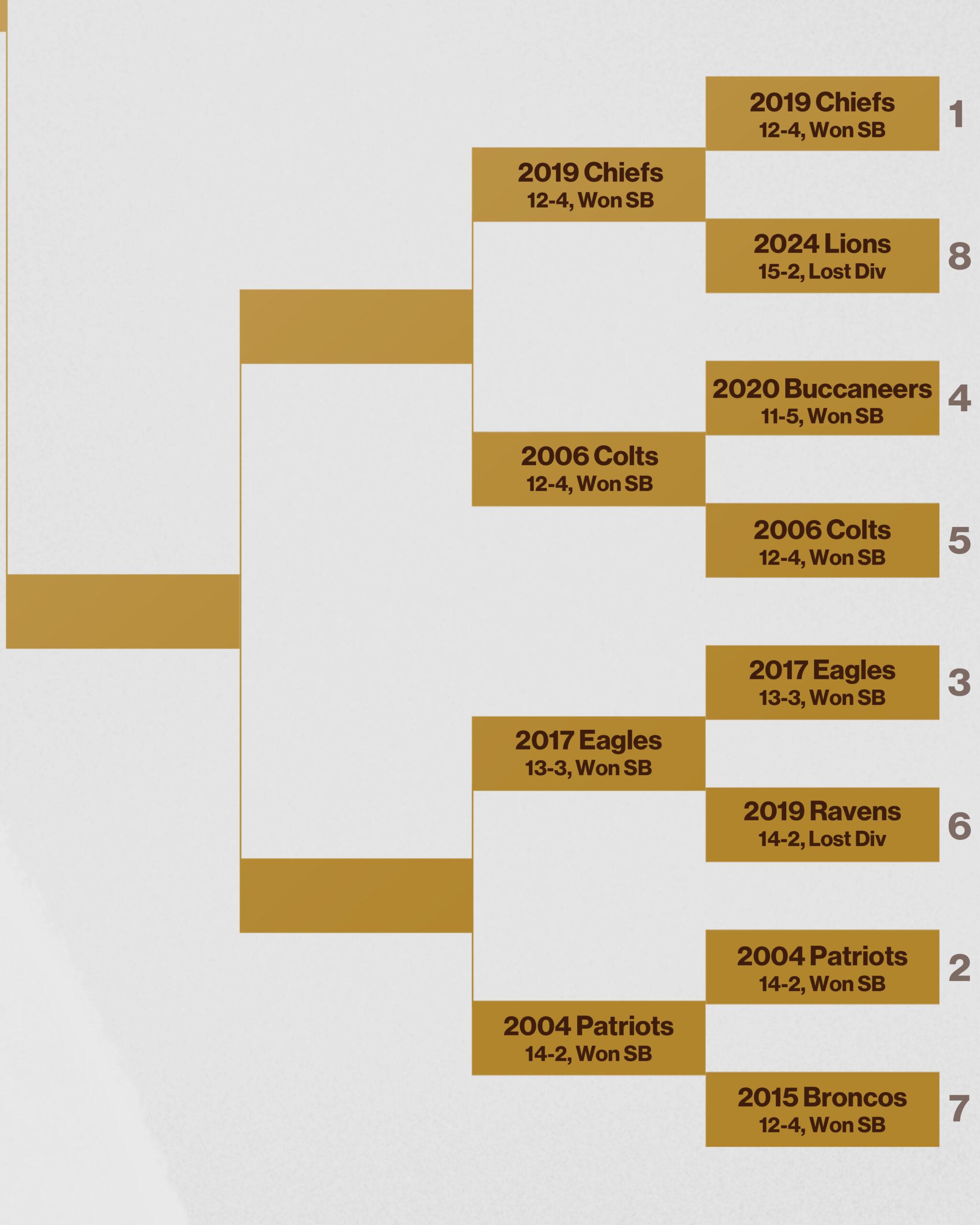
(1) 2019 Kansas City Chiefs vs. (5) 2006 Indianapolis Colts
2019 Chiefs
Record: 12-4
Result: Won Super Bowl LIV (31-20 vs. 49ers)
It was tough to pick the best Chiefs team of the Patrick Mahomes era, so in many ways this 2019 team will account for the incredible three-year run that kicked off his career as a starting quarterback. The 2018 squad was a revelation and finished the regular season ranked first in points (565, the third most of the century), touchdowns, total yards, and yards per play. They were explosive and efficient, and by total offensive EPA, they were the seventh-best offense of the century so far. But they came up short in the playoffs, losing at home to the Patriots in the conference championship and robbing us of a Super Bowl matchup against Sean McVay’s Los Angeles Rams. I may never forgive Dee Ford (or the officiating crew that flagged him for offsides).
The 2019 Chiefs didn’t quite hit the same offensive highs, but this was the year they broke through in the postseason and Mahomes built his legacy as one of the greatest gamers. He led Kansas City back from double-digit deficits in each of their three playoff wins, including the Super Bowl victory over the 49ers. And that 2019 team had defensive closers—Tyrann Mathieu was a huge addition to the secondary, and Chris Jones was an absolute monster in the biggest moments.
The 2020 Chiefs made it back to the Super Bowl, but the offense was a shell of itself by February because of injuries on the offensive line. Ultimately, the 2018 Chiefs might have been more fun, but the 2019 Chiefs were better when it counted, and that’s worth plenty when determining not just the best Chiefs team of the Mahomes era but the best teams of this quarter century. —Jones
2006 Colts
Record: 12-4
Result: Won Super Bowl XLI (29-17 vs. Bears)
Peak Peyton was about as unstoppable as they get (unless, of course, you were also taping opponents’ practices and deflating footballs). Like if Nikola Jokic played quarterback. Manning could peer into a defensive coordinator’s soul, change the play at the line of scrimmage, and seemingly always find Marvin Harrison or Reggie Wayne streaking downfield. Sure, the run defense was as porous as a spaghetti strainer, but the offense was electric and led to Peyton’s only Super Bowl win with the Colts (thank you, Rex Grossman). With Dwight Freeney and Robert Mathis pinning their ears back and a young secondary generating just enough big plays, this baby was a true juggernaut. They finally got over the hump, slayed Tom Brady and Bill Belichick in the AFC title game, and delivered a ring. —Matt Dollinger
(2) 2004 New England Patriots vs. (3) 2017 Philadelphia Eagles
2004 Patriots
Record: 14-2
Result: Won Super Bowl XXXIX (24-21 vs. Eagles)
This team gets the nerd bump. They had the highest DVOA of any of the six Patriots championship teams. Despite a challenging schedule, they went 14-2 in the regular season. In the AFC playoffs, the Patriots faced two legit Super Bowl contenders in the Colts and the Steelers. Indianapolis had averaged a league-best 30.4 points per game in the regular season, but the Patriots shut them down in a 20-3 victory in the divisional round. The Steelers were one of two teams that beat the Patriots in the regular season, but New England got its revenge in the AFC championship, leaving Pittsburgh with a 41-27 victory. They then got past Andy Reid, Donovan McNabb, and the Eagles in the Super Bowl.
This was a classic “do your job and don’t beat ourselves” Bill Belichick team. During their playoff run, the Patriots committed just one turnover and forced 11. That plus-10 turnover margin in the playoffs is tied for second best this century. They might have lacked the star power of future Patriots teams, but this was a balanced group—they finished the regular season in the top five in both offensive and defensive points per game—that could win in different ways. —Kapadia
2017 Eagles
Record: 13-3
Result: Won Super Bowl LII (41-33 vs. Patriots)
One of the great “nobody believes in us” teams of all time. The Eagles looked like legit contenders for most of the year, but Carson Wentz (remember him?) suffered a season-ending knee injury in Week 14 against the Rams. That felt like the funeral for the 2017 Eagles. Another opportunity wasted and an angry (to put it mildly) fan base that would have to go another year without seeing its team win its first Super Bowl. Even late in the regular season things seemed hopeless, but then came a magical playoff run.
The players broke out underdog masks, and the fans rapped along to Meek Mill’s “Dreams and Nightmares.” The defense, led by Fletcher Cox, Brandon Graham, and Malcolm Jenkins, allowed a total of 17 points in playoff wins over the Falcons and Vikings. That set up a Super Bowl matchup against the Patriots. Nick Foles and Doug Pederson vs. Tom Brady and Bill Belichick? On paper, it didn’t seem like a fair fight. Belichick even took a break from game prep to attend a Timberwolves-Bucks game just days before the Super Bowl. But the Eagles’ offensive line was dominant, Foles played the game of his life, and Pederson coached to win, delivering Philly Special, one of the most iconic play calls in Super Bowl history. The offense was so good that the defense needed to make just one play: a Brandon Graham strip sack that one aspiring podcaster had predicted days before.
If you go position by position and just look at talent, there’s not a strong case for this team. But if you believe that football is about the whole being greater than the sum of its parts, it’s hard to beat the 2017 Eagles. —Kapadia
